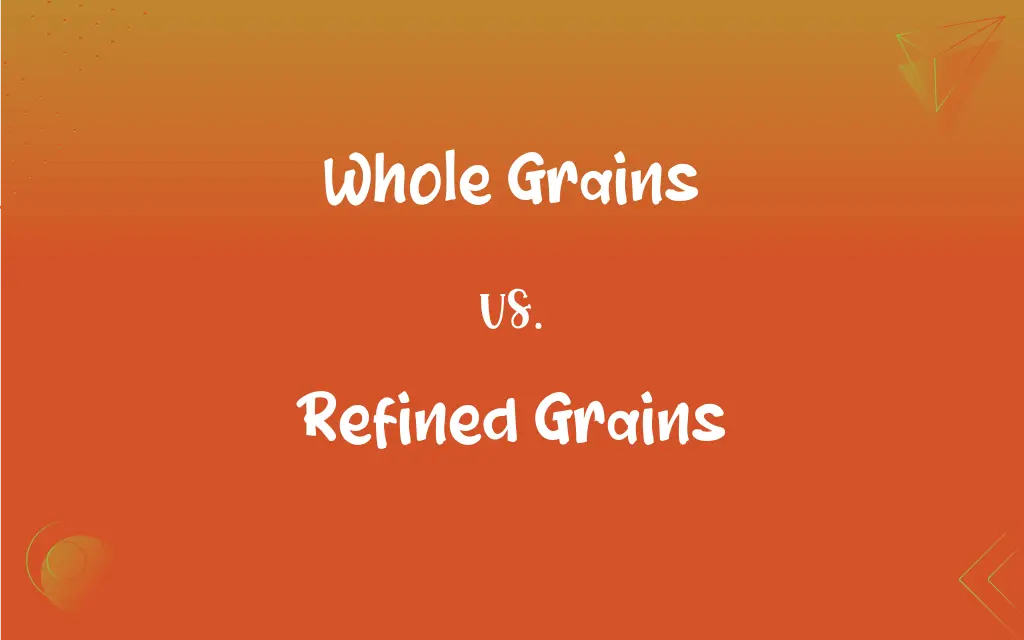Whole Grains vs. Refined Grains: What's the Difference?
Edited by Janet White || By Harlon Moss || Published on January 28, 2024
Whole grains contain all parts of the grain kernel; refined grains are processed to remove bran and germ, reducing fiber and nutrients.

Key Differences
Whole grains consist of the entire grain kernel, including the bran, germ, and endosperm, preserving all nutrients. Refined grains, however, have the bran and germ removed during processing, which strips away essential nutrients and fiber.
In terms of nutritional value, whole grains are superior as they retain natural fibers, vitamins, and minerals. Refined grains are often enriched with vitamins but still lack the natural fiber and essential components found in whole grains.
When considering health impacts, whole grains support better digestion and have been linked to lower risks of heart diseases. Refined grains, with their reduced fiber content, do not offer these health benefits and may contribute to higher blood sugar levels.
From a culinary standpoint, whole grains offer a richer, nuttier flavor and a heartier texture. Refined grains, in contrast, have a softer texture and a milder flavor, making them popular in various processed foods.
In terms of shelf life, whole grains have a shorter shelf life due to the presence of natural oils in the germ. Refined grains, with the germ removed, have a longer shelf life, making them more convenient for long-term storage.
ADVERTISEMENT
Comparison Chart
Nutrient Content
Contains full nutrient profile
Lower nutrient content due to processing
Health Benefits
Promotes digestion, reduces heart disease
Less beneficial for health
Texture and Flavor
Hearty texture, nuttier flavor
Softer texture, milder flavor
Shelf Life
Shorter due to natural oils
Longer due to removed oils
Impact on Blood Sugar
Stabilizes blood sugar
May spike blood sugar levels
ADVERTISEMENT
Whole Grains and Refined Grains Definitions
Whole Grains
Whole grains are a source of essential nutrients like fiber, vitamins, and minerals.
Quinoa, a whole grain, is packed with protein and essential amino acids.
Refined Grains
Refined grains are often enriched but still lack the full spectrum of nutrients.
Enriched pasta is a refined grain product supplemented with certain vitamins.
Whole Grains
Whole grains consist of the entire grain kernel.
Oats are a popular type of whole grain used in breakfast cereals.
Refined Grains
Refined grains have a longer shelf life but less nutritional value.
Processed cereals are often made with refined grains for longer shelf stability.
Whole Grains
Whole grains retain their bran, germ, and endosperm.
Brown rice is a nutritious whole grain that retains all its natural layers.
Refined Grains
Refined grains are processed to improve texture but lose nutrients.
Refined flour is used in cakes for its fine texture, despite its reduced nutritional value.
Whole Grains
Whole grains are grains that have not undergone processing to remove parts.
Whole wheat pasta is made from grains that have kept all their parts intact.
Refined Grains
Refined grains have their bran and germ removed during processing.
White bread is made from refined grains, which lack the wheat's bran and germ.
Whole Grains
Whole grains are unrefined grains with complete nutritional content.
Whole grain bread includes more fiber and nutrients than white bread.
Refined Grains
Refined grains are grains stripped of certain parts, resulting in lower fiber content.
White rice, a refined grain, has less fiber compared to its whole grain counterpart, brown rice.
FAQs
Do refined grains have any nutritional value?
They have some value but are less nutritious compared to whole grains.
What are refined grains?
Grains processed to remove the bran and germ, leaving primarily the endosperm.
Can whole grains aid in weight management?
Yes, their high fiber content can promote fullness and aid in weight control.
Do refined grains affect blood sugar differently?
Yes, they can cause quicker spikes in blood sugar levels.
Are whole grains more expensive than refined grains?
Often, but not always; prices vary based on type and brand.
Can refined grains be part of a healthy diet?
In moderation and as part of a balanced diet, they can be.
Is it easy to digest whole grains?
They can be harder to digest for some due to high fiber content.
Can whole grains reduce the risk of heart disease?
Yes, their nutrient profile can help lower the risk.
What are whole grains?
Grains that include all parts of the grain kernel: bran, germ, and endosperm.
Why are whole grains considered healthier?
They retain all nutrients, fibers, and vitamins, offering more health benefits.
Are refined grains bad for health?
They are not inherently bad but are less beneficial due to reduced nutrient content.
Are refined grains more processed than whole grains?
Yes, they undergo more processing to remove parts of the grain.
Do whole grains have a different taste than refined grains?
Yes, they often have a nuttier, richer flavor and heartier texture.
Do whole grains have a shorter shelf life?
Yes, due to the presence of natural oils in the germ.
Can refined grains be fortified?
Yes, they often are fortified with vitamins and minerals.
How do whole grains affect blood sugar?
They help stabilize blood sugar levels due to their high fiber content.
Can eating whole grains help with digestion?
Yes, their high fiber content aids in digestion.
Are there gluten-free whole grains?
Yes, such as quinoa, buckwheat, and millet.
How can one incorporate whole grains into their diet?
By choosing whole grain versions of bread, pasta, and rice.
Is white bread a refined grain product?
Yes, it is made from refined grains with the bran and germ removed.
About Author
Written by
Harlon MossHarlon is a seasoned quality moderator and accomplished content writer for Difference Wiki. An alumnus of the prestigious University of California, he earned his degree in Computer Science. Leveraging his academic background, Harlon brings a meticulous and informed perspective to his work, ensuring content accuracy and excellence.
Edited by
Janet WhiteJanet White has been an esteemed writer and blogger for Difference Wiki. Holding a Master's degree in Science and Medical Journalism from the prestigious Boston University, she has consistently demonstrated her expertise and passion for her field. When she's not immersed in her work, Janet relishes her time exercising, delving into a good book, and cherishing moments with friends and family.







































































